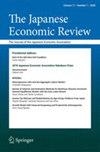日本的分配偏好
IF 0.5
4区 经济学
Q2 ECONOMICS
引用次数: 1
摘要
利用Engelmann和Strobel(2004)开发的实验,本研究调查了日本的分配偏好。我们发现,研究中超过一半的人有最大偏好,大约7%到19%的人有效率偏好,大约8%的人有自利偏好,大约18%的人选择了会减少对富人和穷人的回报的分配,假设她/他的回报保持不变。最后一种偏好可以解释为行为经济学和跨文化心理学中所谓的“恶意”、“深深嫉妒”或“脆弱感”。本文章由计算机程序翻译,如有差异,请以英文原文为准。
Distributional preference in Japan
Using experiments developed by Engelmann and Strobel (2004), this study investigates distributional preference in Japan. We find that just over half the people in the study have a maximin preference, approximately 7 to 19% have an efficiency preference, approximately 8% have a self-interest preference, and approximately 18% chose the allocation that would reduce the payoff to the rich and the poor, given that her/his payoff would remain constant. The last preference could be interpreted as what is referred to as “malice”, “deep envy” or a “feeling of vulnerability” in behavioural economics and cross-cultural psychology.
求助全文
通过发布文献求助,成功后即可免费获取论文全文。
去求助
来源期刊

Japanese Economic Review
ECONOMICS-
CiteScore
2.70
自引率
0.00%
发文量
15
期刊介绍:
Started in 1950 by a group of leading Japanese economists under the title The Economic Studies Quarterly, the journal became the official publication of the Japanese Economic Association in 1959. As its successor, The Japanese Economic Review has become the Japanese counterpart of The American Economic Review, publishing substantial economic analysis of the highest quality across the whole field of economics from researchers both within and outside Japan. It also welcomes innovative and thought-provoking contributions with strong relevance to real economic issues, whether political, theoretical or policy-oriented.
 求助内容:
求助内容: 应助结果提醒方式:
应助结果提醒方式:


